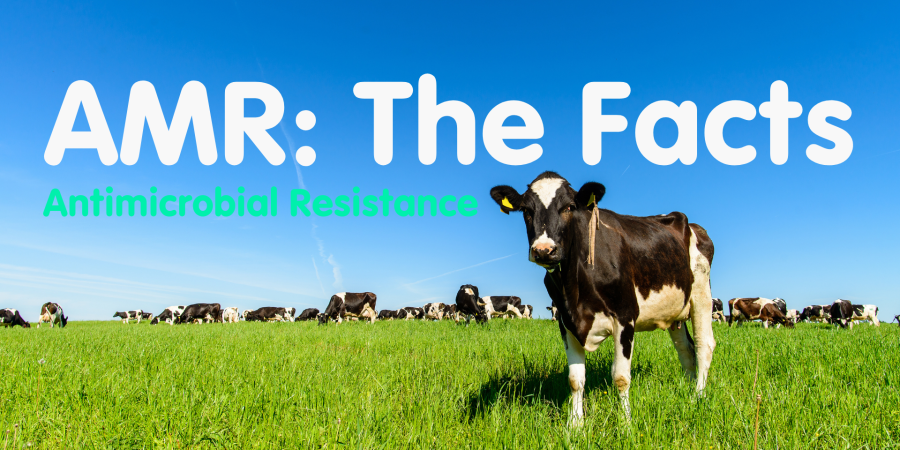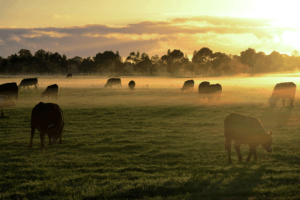Antibiotics can treat bacterial infections, but they do not work against viruses. It is vital that we only use antibiotics when necessary, that way they are more likely to work when we need them.
AMR - What is it?
AMR stands for Antimicrobial Resistance. Antimicrobial resistance happens when bacteria and other microbes evolve and become able to resist the effects of medicines designed to stop or kill them. As a result the medicines (eg antibiotics) become ineffective, and infections in animals and humans become much harder to treat.
If antimicrobial resistance continues increasing at the current rate, many antibiotics will not work and even routine medical practices could become more risky.
How does AMR affect farm animals?
Antimicrobial resistance impacts on animal health, human health and the reputation of the agricultural and food industries.
Resistant bacteria may be spread from animals to humans (and vice versa) via direct contact, environmental contamination and potentially through food-borne bacteria.
Resistance makes treating infections in animals and humans more difficult and in some cases impossible.
Use antibiotics as little as possible, and as much as necessary.
What increases the risk of AMR?
AMR is a natural phenomenon where microbes adapt to survive in the presence of medicines that will stop their growth or kill them. The overuse and misuse of antibiotics increases the speed at which this phenomenon develops, specifically:
- Using antibiotics when they are not needed. Antibiotics do not work against viral infections.
- Using the wrong antibiotic for the wrong infection.
- Giving the incorrect dose.
- Not finishing the complete course of prescribed antibiotics.
- Sharing antibiotics across a herd without a diagnosis.
All of these causes can be eliminated by following your Vet’s advice and instructions.
What can be done to help tackle AMR?
Preventing the cause and reducing sources of infection will be beneficial to the long term health of your herd and will reduce the need for antibiotics. Healthier animals are more productive, cost less to rear, have a lower environmental footprint and higher welfare status. The key to reducing the rate at which AMR is developing is to reduce disease burden, which will decrease the need for antibiotics.
Developing a tailored Herd Health Plan with your Vet is one of the best ways to tackle AMR on your farm. A Herd Health Plan addresses potential health threats and seeks to minimise the need for antibiotics on your farm. It will list what preventative measures you can take to reduce the likelihood of infection on your farm, and it will outline the agreed treatment plan for specific diseases, should one of your animals become ill. Your Herd Health Plan should be updated regularly and reviewed annually with your Vet.
What measures can I take to help prevent infection developing and spreading?
There are many things you can do on your farm to reduce potential sources of infection as well as prevent and control diseases.
- Biosecurity – ensure you only buy animals from dealers or other farms with high health standards
- Isolate recently bought or sick animals
- Work with your Vet to develop and implement a Herd Vaccination Programme – this will outline which vaccines your animals will need and when.
- Ensure animal houses are clean and well-ventilated
- Regularly disinfect equipment and machinery.
- Establish good hygiene practices for workers and visitors – washing hands, wearing protective clothing etc.
- All fencing should be kept in good condition, with hedges or a double fence created next to neighbouring farms.
What should I do if one of my animals gets an infection?
If one of your animals is ill, the animal should be isolated and you should contact your Vet for a diagnosis and to discuss a treatment plan.
- Giving antibiotics to an animal unnecessarily, sharing antibiotics across a herd, or using the wrong antibiotic for the wrong infection could increase the risk of AMR.
- It is important to follow the Vet’s instructions regarding dosage and the length of course. Giving an incorrect dosage or stopping treatment before the antibiotic course is complete, even if the animal appears well, could increase the risk of partially resistant bacteria surviving and the infection recurring.
For any infection in your animals, you should keep records of treatment and disease and investigate the cause with your Vet. This will enable you to make changes on your farm to reduce the disease burden and likelihood of infection recurrence.
What are government departments doing to help?
Resistance isn’t just a problem for human medicine. It is also about farming; veterinary medicine; the food chain and the environment. These are all inextricably linked and called The One Health approach. This is why the departments for Health (DoH) and Agriculture, Environment and Rural Affairs (DAERA), along with the Food Standards Agency (FSA) are working together – across government and disciplines, and with public bodies and the research community, to tackle this issue. The “One Health Action Plan for Northern Ireland – Changing the Culture” to address antimicrobial resistance has been developed, which outlines measures to reduce the need for antibiotics by preventing infection through improved hygiene; biosecurity measures, and the implementation of effective vaccination strategies.
What does AMR mean for your farm?
Watch this short video below to learn more.



